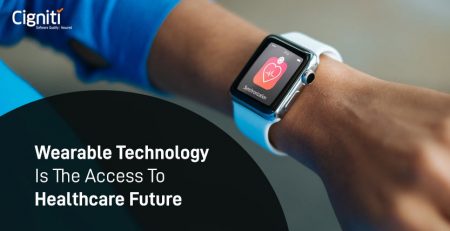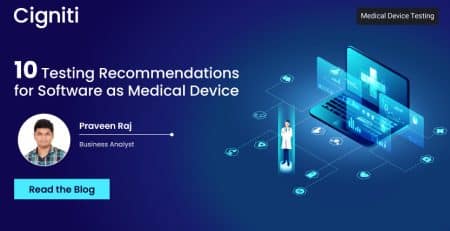Understanding The Different Types Of Medical Device Testing
WHO defines a medical device as an article, instrument, apparatus, or machine used in the prevention, diagnosis, or treatment of illness or disease or for detecting, measuring, restoring, correcting, or modifying the structure or function of the body for some health purpose. Typically, the goal of a medical device is not achieved by pharmacological, immunological, or metabolic means.
As a medical device directly contributes to a healthcare facility’s ability to evaluate a patient’s condition accurately, it is essential for safe and effective prevention, diagnosis, treatment, and rehabilitation of illness and disease.
With the help of medical devices, healthcare practitioners can collect the exact stats of a patient’s health and make medical decisions judiciously. The rise of digital usage in the medical space has paved the way for software-enabled medical devices that have brought significant sophistication in modern medical device technology.
Today, we have innovative pacemakers, insulin pumps, defibrillators, robotic surgeons, and other groundbreaking technologies with healthcare practitioners’ assistance.
Since so much relies on a medical device’s capability to perform as intended and with precision, even a minor glitch can prove fatal. This is why conducting thorough medical device testing before they are channeled for practical use is essential.
Several regulations and compliance requirements must be fulfilled to ensure this before a medical device is released on the market. Medical device testing not only performs the Verification and validation (V&V) but also evaluates various aspects of the medical device based on performance, GUI, behavior, and reliability, among others, to prevent the usage of any faulty device on a patient.
Let us understand what exactly the different types of medical device testing are and what each of those types entails:
Types of medical device testing
Medical device testing includes an end-to-end analysis, assessment, and evaluation of any medical device to certify that it performs as intended, does not provide faulty information, and is fit for practical usage.
An adequately tested medical device also meets the required federal and regulatory criteria.
These are the different types of medical device testing when it comes to a software-enabled medical device:
Lifecycle Verification &Validation:
As per the FDA, Software verification provides objective evidence that the design outputs of a particular phase of the software development life cycle meet all specified requirements. It looks for the software’s consistency, completeness, correctness, and supporting documentation as it is being developed. It also provides support for a subsequent conclusion that the software is validated. On the other hand, the FDA considers software validation to be “confirmation by examination and provision of objective evidence that software specifications conform to user needs and intended uses and that the particular requirements implemented through software can be consistently fulfilled.”
GUI testing:
GUI testing verifies that the medical device responds appropriately to the UI-based inputs. With GUI testing for medical devices, issues like UI complexity causing user confusion, usage delay, data entry errors, false inputs, and others can be prevented so that they do not become a reason for a life-threatening situation during real-life application.
Performance testing or Bench testing:
This type of testing is designed to rule out performance-related mechanical or design flaws in the medical device. Performance bench testing of medical devices also evaluates their endurance and capability to perform with the same efficiency under different forms of load.
Compliance testing:
There are various federal and regulatory criteria set by different medical bodies to ensure that a medical device in circulation is safe and effective. Compliance testing ensures that the medical device fulfills all the requirements set for quality and safety by following optimal quality design and manufacturing practices.
Interoperability testing:
FDA defines medical device interoperability as the ability to safely, securely, and effectively exchange and use information among one or more devices, products, technologies, or systems. Interoperability testing evaluates a medical device’s ability to share data across systems and platforms to improve patient care and reduce errors and adverse events.
Reliability testing:
With reliability testing of a medical device, it is assessed on its ability to perform satisfactorily under varied periods and even in stressful conditions. It tests the medical device for its reliability in any situation.
Medical Devices Testing – A case study
To simplify and customize the delivery of complex drug regimens, an innovative medical device manufacturer developed a first-of-its-kind technology for insulin delivery methods. The company was looking for end-to-end testing & quality engineering services from an organization that could provide a robust framework for integrating software, mobile devices, and medical devices.
Cigniti ensured both high quality & compliance for the client’s medical devices by establishing QA best practices and reducing their test time by more than 50%. Read the complete success story of that medical device manufacturer.
How can we help
Cigniti is an ISO13485:2016 certified organization & the chosen Software Testing services partner for large Medical Device manufacturers and users. We help you address challenges in Medical device software testing and implement guidelines & best practices in the software testing lifecycle of these devices.
Our dedicated Medical Devices Testing CoE experts help Verify and validate Software for surgical instruments, contact lenses & ultrasound scanners, orthopedic implants & hemodialysis machines, and cardiac pacemakers. They are fully capable of helping clients test their smart, AI-based medical & healthcare devices, such as intelligent beds, sterilization equipment, tool kits for pets, and more.
Schedule a discussion with us to consult with our experienced team for Medical Device Testing services.




Leave a Reply